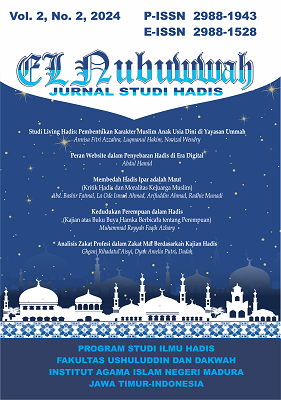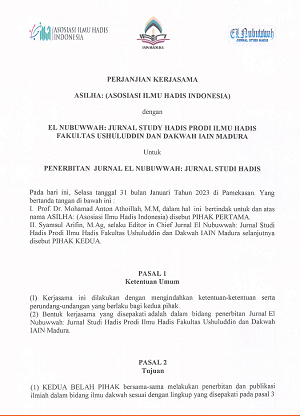Social Status of Transgender Individuals in the Prophetic Era and in Modern Pakistan
 Abstract views: 209
,
Abstract views: 209
,
 PDF downloads: 127
PDF downloads: 127
Abstract
The research study investigates how transgender people were treated in both the time of Prophet Muhammad and contemporary Pakistan which has led to major transformations in social responses and legal systems and religious doctrinal perspectives. Linking to research findings shows early Islamic society recognized and respected mukhannathun transgender people but modern Pakistan includes legal progress alongside continued social discrimination against transgender groups. The analysis of transgender rights reveals how religious beliefs interact with cultural heritage as well as modern lawmaking regarding transgender people's rights protection. Islamic principles of justice and compassion form the basis of inclusivity but social prejudices alongside historical changes have led to marginalization. Through the Transgender Persons (Protection of Rights) Act, 2018 Pakistan has achieved legal recognition but social acceptance and legal recognition exist in significant tension with one another. This study entails multiple constraints which affect its effectiveness. The study of the Prophetic era depends mostly on scarce textual evidence which receives varied interpretations through different Islamic scholarly positions. The contemporary issues which transgender individuals in Pakistan experience are changing and need further research for understanding how legal changes specifically affect their everyday life. The research adds value to present transgender rights scholarship through its analysis of Islamic perspectives at different historical periods. The study performs a comprehensive analysis of transgender rights interactions between Prophet Muhammad's time and present-day Pakistan through documented comparative examinations. Future scholarly attention should adapt towards examining how Pakistani transgender rights can become practical while exploring religious scholar involvement and government decision making in creating inclusive Pakistan. Research that examines transgender rights approaches inside Muslim-majority nations will give important insights regarding Islamic perspectives on transgender matters.
Downloads
References
Abbas, Tahir, Younas Nawaz, Muhammad Ali, Nadeem Hussain, and Rizwan Nawaz. “Social Adjustment of Transgender: A Study of District Chiniot, Punjab (Pakistan).” Academic Journal of Interdisciplinary Studies 3, no. 1 (2014): 61.
Afif, Muhammad Badrul. “Islam and Transgender (A Study of Hadith about Transgender).” International Journal of Nusantara Islam 7, no. 2 (2019): 185–189.
Ahmad, Muhammad Waqas. The Invisible Human: A Reflective Autoethnography about the Lives of Pakistani Transgender People. PhD diss., University of Toronto, 2021.
Aiyetoro, Abiola Ibrahim. “Belonging to Opposite Sex: Islamic Perspectives on Gender Identity.” Religions 17 (2023): 20–141.
Ali, Muhammad Usman. “Gender Identity and the Issues of Acceptance in Pakistani Community.” Global Sociological Review 1 (2020): 7–15.
Ali, Shaheen Sardar. “Pakistan: Challenges and Prospects.” In Normativity and Diversity in Family Law: Lessons from Comparative Law, 51–73. 2022.
Alipour, Mohammad. “Islamic Shari'a Law, Neotraditionalist Muslim Scholars and Transgender Sex-Reassignment Surgery: A Case Study of Ayatollah Khomeini's and Sheikh al-Tantawi's Fatwas.” International Journal of Transgenderism 18, no. 1 (2017): 91–103.
———. “Transgender Identity, the Sex-Reassignment Surgery Fatwās and Islāmic Theology of a Third Gender.” Religion and Gender 7, no. 2 (2017): 164–179.
Aswindasari, Anis, and Marhamah Marhamah. “Response of the Qur’an to the Transgender Phenomenon: Study of Maqashidi's Interpretation.” QiST: Journal of Quran and Tafseer Studies 3, no. 2 (2024): 281–302.
Bano, Samia, and Faiza Zulfiqar. PIDE School of Social Sciences Pakistan Institute of Development Economics, Islamabad. 2024.
Etengoff, Chana, and Eric M. Rodriguez. “‘At Its Core, Islam Is about Standing with the Oppressed’: Exploring Transgender Muslims’ Religious Resilience.” Psychology of Religion and Spirituality 14, no. 4 (2022): 480.
Fikriana, Afifah. “Hukum Merubah Jenis Kelamin Atau Transgender Ditinjau dari Perspektif Al-Quran Hadis dan Hukum Positif di Indonesia.” Al-Zayn: Jurnal Ilmu Sosial & Hukum 1, no. 1 (2023): 74–82.
Haddad, Yvonne Yazbeck, and John L. Esposito, eds. Islam, Gender, & Social Change. New York: Oxford University Press, 1998.
Halil, Noor Faizah, et al. “Mukhannath dan Hubung Kaitnya dengan Transgender Menurut al-Qur’an dan al-Sunnah.” In International Prophetic Conference (SWAN) FPQS USIM, no. 8 (December 2022): 200–209.
Hamzic, Vanja. Sexual and Gender Diversity in the Muslim World: History, Law and Vernacular Knowledge. Vol. 1. London: Bloomsbury Publishing, 2019.
Iqbal, Hafiz Muhammad Adil, et al. “A Critical Review of Islamic Teachings and Transgender Activism.” Journal of Positive School Psychology 7, no. 6 (2023).
Jami, Humaira, and Aisha Kamal. “Myths about Hijras (Male-to-Female Transgender of Hijra Community)? Role of Gender and Commonly Held Belief about Them.” Foundation University Journal of Psychology 1, no. 1 (2017): 63–76.
Khan, Faris A. Khwaja Sira: Culture, Identity Politics, and 'Transgender' Activism in Pakistan. PhD diss., Syracuse University, 2014.
Khan, M. Raza, and Muhammad Asim Perveen. “Transgender Sharia, Legal and Social Status.” The Islamic Culture "As-Saqafat-ul Islamia" الثقافة الإسلامية-Research Journal-Sheikh Zayed Islamic Centre, University of Karachi 49, no. 1 (2024).
Khan, Shahnaz. “What Is in a Name? Khwaja Sara, Hijra and Eunuchs in Pakistan.” Indian Journal of Gender Studies 23, no. 2 (2016): 218–242.
———. “Khwaja Sara, Hijra, and the Struggle for Rights in Pakistan.” Modern Asian Studies 51, no. 5 (2017): 1283–1310.
Khan, Urooj, et al. “Civil Rights and Responsibilities of Transgenders in the Context of Islamic Jurisprudence.” Revista Espanola de Documentacion Cientifica 17, no. 1 (2023): 38–48.
Kugle, Scott Siraj al-Haqq. Living out Islam: Voices of Gay, Lesbian, and Transgender Muslims. New York: NYU Press, 2014.
———. Homosexuality in Islam: Critical Reflection on Gay, Lesbian, and Transgender Muslims. New York: Simon and Schuster, 2010.
Majeedullah, Aisha. “Living on the Periphery: The Khawaja Siras of Pakistan.” Sexuality, Poverty and Law (2016): 21–22.
Muhsin, Syed Mohsin, et al. “Sex Reassignment Surgery, Marriage, and Reproductive Rights of Intersex and Transgender People in Sunni Islam.” Archives of Sexual Behavior (2024): 1–14.
Munawar, Hina, and Farhat Nawaz. “Transgender Person Protection Bill in Light of Teachings of Holy Quran and Sunnah.” Al-Qawārīr 5, no. 1 (2023): 11–25.
Murray, Stephen O., and Will Roscoe. Islamic Homosexualities: Culture, History, and Literature. New York: NYU Press, 1997.
Naraghi, Arsham. “The Quran and Human Rights of Sexual Minorities.” In The Lesbian, Gay, Bisexual and Transgender Community of Iran Examining Human Rights from Religious, Social, Legal and Cultural Perspectives 2 (2015): 33–61.
Pamment, Claire. “Hijraism: Jostling for a Third Space in Pakistani Politics.” TDR: The Drama Review 54, no. 2 (2010).
———. “Performing Piety in Pakistan's Transgender Rights Movement.” Transgender Studies Quarterly 6, no. 3 (2019): 297–314.
Paul, Olivia. Evaluating the Effects of Possible Religious Incitement to Discrimination on the Human Capabilities of Khawaja Siras in Pakistan. PhD diss., Columbia University, 2018.
Qadeer, Mohammad. Pakistan: Social and Cultural Transformations in a Muslim Nation. London: Routledge, 2006.
Rafaqat, Muhammad Taqi, Tehmina Rafaqat, and Sadaf Bibi. “Social Status of Transgenders in Prophetic Period.” Al-Durar 4, no. 2 (2024).
Rafiq, Tehmina. “Gender Dysphoria and Islamic Perspective of Gender-Related Issues.” 2022.
Rehman, Javaid, and Eleni Polymenopoulou. “Is Green a Part of the Rainbow: Sharia, Homosexuality, and LGBT Rights in the Muslim World.” Fordham International Law Journal 37 (2013): 1.
Roscoe, Will. “Priests of the Goddess: Gender Transgression in Ancient Religion.” History of Religions 35, no. 3 (1996): 195–230.
Roscoe, Will, and Stephen O. Murray, eds. Islamic Homosexualities: Culture, History, and Literature. New York: NYU Press, 1997.
Sarcheshmehpour, Zahra. The Legal and Social Aspect of Transsexuality Among Muslims: A Study in Muslim Countries with Special Reference to Iran. PhD diss., University of Malaya, 2019.

























